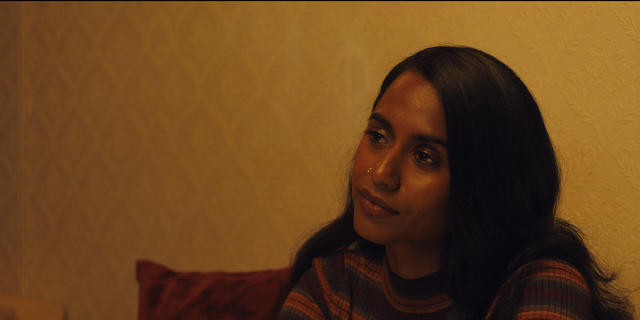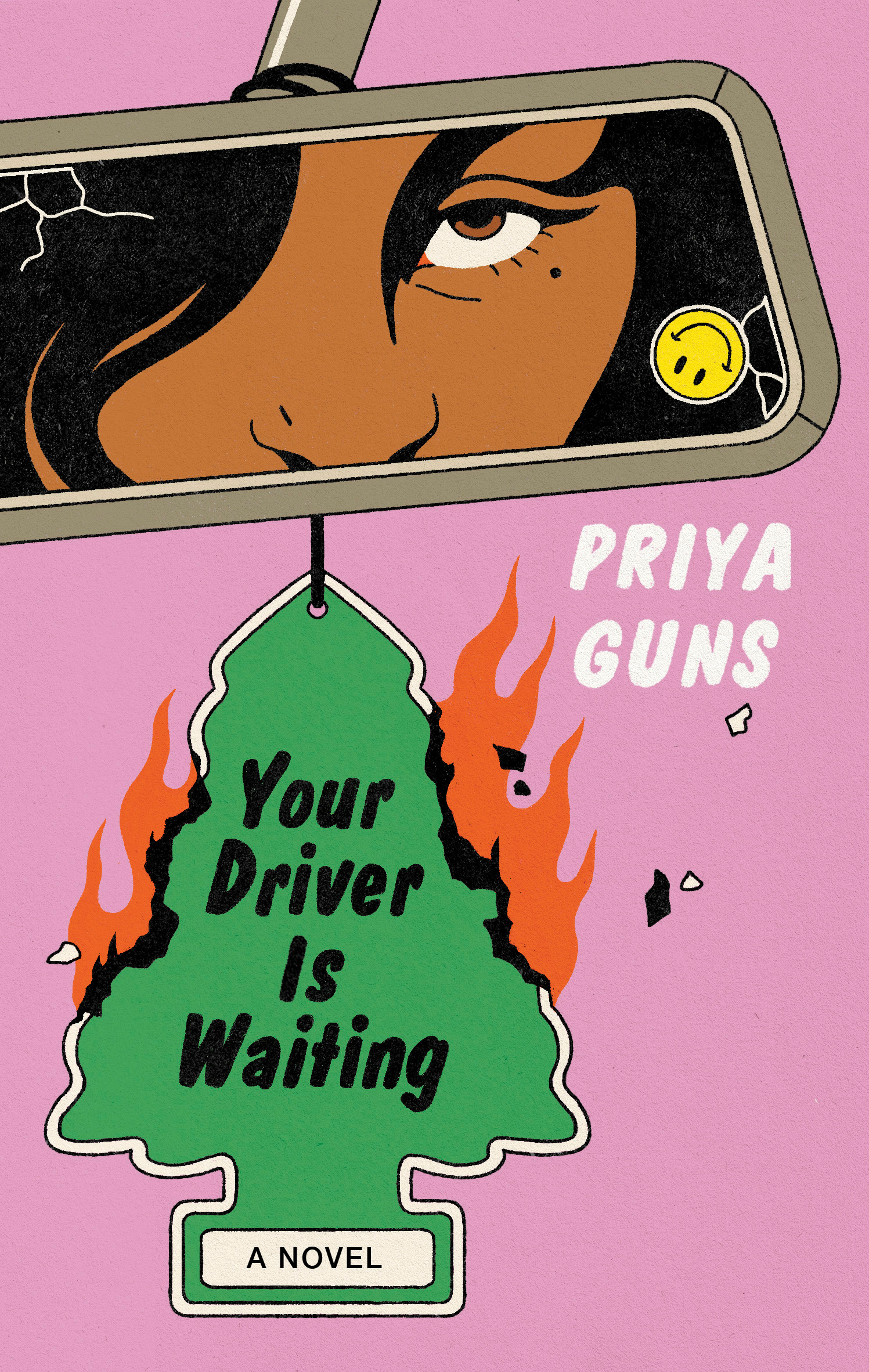In her debut novel ‘Your Driver is Waiting’, Priya Guns challenges us to rethink the lies we are told about capitalism. Following the death of her beloved Appa at his minimum wage job, Damani’s life is thrown into turmoil. Unable to put her degree to use, she keeps her family afloat, driving her late father’s old car for a ride-share company. Her mother’s all-consuming grief forces Damani to become her carer. Navigating through a crumbling city, Damani is haunted by heartbreaking memories of her Appa, compelling her to confront her own grief and loss.
Despite the magnitude of her burden, Damani finds pockets of peace with her chosen family; fellow children of immigrants and working-class people with whom she frankly discusses sobering realities of shared oppression. Damani falls in lust and even begins to dream again. When Damani’s life (inevitably) falls apart once again, we see her dig deep. Like generations of resilient Tamil women who came before her, she picks herself back up to carry on. Bills don’t wait for crises: existential, mental or otherwise.
There is a stark contrast between the glamour and illusion of Jolene’s activism and the effective but chronically underfunded grassroots organising that Damani’s community engages in. Was this reflective of your experiences in your activism?
Yes, massively. And when I was planning and writing this novel in 2020, I was seeing the protest for Black Lives Matter… the people at the protest… I didn't trust all of them, you know? I'm living in a small town and it was nice to see people coming together, chanting ‘Black Lives Matter.’ That was nice, but something else just didn't sit right [because]… everyone's [going to] go home. They're [going to] read the books, but how does that come out practically? What does this mean? When we understand how the current system oppresses people, what actions do we take towards eliminating that oppression and subjugation? It was enraging. And I know that… everybody learns at different times, but when you're from an oppressed people and you know what's happening, it's infuriating.
We see Damani apologise to her friends for not being present for activist and union meetings, and again for bringing Jolene into their lives (with disastrous consequences). And yet, she is always met with understanding, patience and compassion. Is there a message here?
Well… I wanted to show positive examples of as much as I could because in the background, the world and the city is crumbling. But the reality of it is, when people love and care for each other, and hopefully everyone has had some sort of therapy, you understand that someone is going through something. And sometimes, at least in my life, I've met people who like to assume the worst. They like to assume that this person is conspiring against me, or… these people have it out for me. And that comes from a place of a lot of pain. So I wanted to show something a little bit different.
I don't think it's anything new, but people like to… point fingers and blame other people for… maybe the problems that they're in. ‘You're poor because … we're going through this because you're not doing enough.’ And even when we think about social justice… for a long time it's been about the consumer. And yes, we should be making certain choices… and we should be mindful of the choices we make… but at the same time, there's a bigger structure at play… And we're humans and we're trying to do our best. So I wanted to show that… in this case with Damani, you can't blame drivers for the situation they're in. I mean, they can't always go out and protest because they're tired, they are working, they have to work. If they don't work, then there's no food, there's no security. And so that's why I think it's also important when we see issues and things going on that don't affect us directly, that doesn't mean that we just sit back. If we can and we're able to, then there are things to do to make whatever situation much better.

Was it important to address the criminalisation of racialised activists as you did in Shereef’s brush with law enforcement?
Well, I think that's a reality. I think that's true in our lives… for me at least, this is life… No matter what you're doing, race affects and impacts you in a different way. We see that the oppressed who fight against their oppression are deemed ‘terrorists’ or ‘disruptors’ of a sort. I don't [want to] give spoilers away, but… [Shereef’s] existence is part of the big blow up.
Shereef for me was really important because he was… the vehicle of a particular political perspective… I think offering some sort of solution or a way of thinking is important while we're addressing so many problems in conflict… It's so important for people to understand when they're joining something, to really listen and learn from the people who are on the ground.
There is a monolithic portrayal of Eelam Tamils in both media and academia. Your main character is a bisexual rideshare driver who cares for her mother. How important do you think it is for Eelam Tamils to become the narrators of their own complex and varied lives and experiences across the diaspora?
I think if people [want to]... some people are just like, ‘I don't wanna share my story.’ That's fine. But I think, if you are a storyteller, then it's important to tell your own story regardless of what your ethnicity is… I think right now in this whole realm of identity politics, there's identitarianism where people… assume that because you are of this… whatever identity… you think a certain way, you behave a certain way and you have particular beliefs.
But it's important to understand that we're all different. We all left the island at a different time as well with different experiences. We're [going to] have different opinions. And in order for any sort of change to exist, no matter where and what we're talking about, we have to see that… we have similarities, but we're not the same person.
What was it like writing the complex relationship between Damani and her Amma?
It was very eye opening for me to think about my own relationship, not just with my mother, but with all the women in my life… Even my friends coming from different places in Toronto. A lot of people in Toronto are in Toronto because they… had to leave a situation that was not comfortable. We can talk about colonialism and imperialism and the effects it has on very real people. And Toronto is an interesting city…, we're all kind of in this city having had these experiences. So, thinking about even my friends from Iran, Afghanistan, Guyana, and the relationship that they have with their mom[s] was also very inspiring.
It really made me think about our role, especially as eldest daughters as carers or just daughters in general, and the complexity in those relationships. Because, of course there's a lot of love. But there is also anger, there's frustration, there's exhaustion. Who can you turn to, to talk about these issues when everyone's… dealing with it? But at the same time, you don't [want to] talk about it because it's so exhausting.
I was thinking about [it] a lot. I wanted to not only express what Damani was feeling; I wanted to give her mom a fair portrayal of why she could not move. There was a lot of sadness there. And I wanted her to have a moment where she sees that her daughter is falling and slipping, and she knew… it's almost like we passed the baton. ‘Okay, it's my turn’. I wanted her to have some of the spotlight in a positive way because I think in a lot of ways, the women in our lives are fighters… in every which way.
“As they’d gotten older and worked a little less, I think they were surprised by the time they had. How do you know how to like when you’ve never been given the freedom to?” How important was it to you to convey the immigrant experience in your novel?
Oh, this was so important to me because… I think there is a reality where a lot of our fathers or uncles have worked back of the house, for instance. I remember being in Laos… and there's an uncle in the back cooking food… Somebody once told me a story about how they went to Siberia… and there was a Tamil uncle cooking at the back of the house. It was important for me to… portray our connection to food, somehow.
The situation that Damani was in - I had to contextualize it. When your parents were working one/two jobs at a restaurant or as a cleaner… There was no time to think about anything else. It was like, ‘I'm [going to] work. I need to provide for my kids, and they're [going to] have a great life. They are [going to] go to university.’ And of course, there was that pressure in a lot of homes… ‘They're [going to] do all of these things, and we're [going to] be so proud, and maybe, one day, they'll take care of us…’ I guess that logic makes sense, but it's tiring for everybody. I mean, this is a symptom, or an outcome of the capitalist system… ‘They took our jobs’, is what they like to say about immigrants. But it's like: no, you want us to do the things that nobody else is [going to want to] do. It’s far more complex than this, of course.

‘“Nah babe, it’s cool.”
“You still haven’t unlearned it, have you? When someone asks you if you want something –”
“I can say yes,” I teased.’
Priya’s portrayal of Damani is a message of hope to the exhausted eldest daughters of immigrants everywhere. You are not alone.
Five works of art which inspired Priya:
1. It's always changing - I am inspired most by the natural world, human beings and then all kinds of music.
2. Martin Scorsese's Taxi Driver
3. Boots Riley's Sorry to Bother You
4. BBC's Killing Eve soundtrack
5. Run the Jewels - RTJ4
We need your support
Sri Lanka is one of the most dangerous places in the world to be a journalist. Tamil journalists are particularly at threat, with at least 41 media workers known to have been killed by the Sri Lankan state or its paramilitaries during and after the armed conflict.
Despite the risks, our team on the ground remain committed to providing detailed and accurate reporting of developments in the Tamil homeland, across the island and around the world, as well as providing expert analysis and insight from the Tamil point of view
We need your support in keeping our journalism going. Support our work today.
For more ways to donate visit https://donate.tamilguardian.com.


